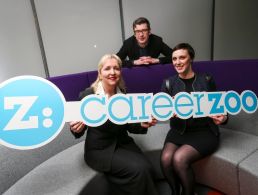The internet has helped users solve problems for years now, but the introduction of cloud technology and cloud thinking has taken us several steps further. Now the best minds compete for your work, possibly from thousands of miles away.
In computer science, the modern worker is, perhaps, a different animal to someone of yesteryear.
Forever upskilling, challenging themselves and keeping up with an intricate online world that they are helping to shape, whole communities of problem solvers have emerged to satisfy a key strand of modern business – project-based work.
After years of developing a digital ecosystem that brought everything we ever wanted into our computers, phones and even wrists, the time may have come when labour, too, is beamed to and fro.
‘I believe Appirio is in a position to be the Uber of the systems integration space’
TIM MEDFORTH, SVP EMEA APPIRIO
We recently came across Appirio, a new-age IT consulting company armed with a pretty cool tool, TopCoder.
TopCoder is a platform with an 800,000-strong computer science community, from teenage web designers to octogenarian problem solvers.
Joining for free, they dabble in everything from robotics and app creation to web design and software writing, lending a hand to miniscule or massive projects – all through the guise of competition.
The challenge is on
A challenge is set to write a piece of software, say, and a financial reward is provided. People compete to satisfy the criteria best, payment is determined by how well they do.
A new, transient workforce, as it were.
Last month, NASA worked on a competition on TopCoder to establish a piece of software that could help predict where earthquakes are likely to hit ahead of time.
Spotting a trick, the agency sought help from the cloud, offering US$25,000 to develop a solution, with the help of reams of valuable data to work with.
The graphic below, provided by NASA, gives a basic explanation of what it was that the contestants had to do to earn their crust – click to view it in a larger format.
Worldwide platform, but for who?
It wasn’t the first – nor the last – NASA competition set on a platform that has, broadly speaking, three types of competitor.
There are designers, developers and data scientists everywhere from India to China, northern Europe to the US, all waiting for the competition that best suits their talents.
“TopCoder was set up in 1992 by computer geeks who wanted to compete in solving complex, algorithmic problems,” explained Tim Medforth, senior vice-president of EMEA with Appirio.
“Over time they monetised the community. They thought ‘we’re good, we’re clever, we can do this’,” he added, of a community bought by Appirio two years ago.
Naturally enough there is a massive demand for skilled tech talent. We see it in Ireland a lot, but it’s true almost everywhere.
Supply and demand
The reason developers, for example, get paid a bomb is not because the work done is magic, stardust-laden witchcraft, it’s because there’s a finite pool of workers.
Despite more and more people attaining the skills needed to enter the workforce, the numbers still lag behind the explosion of companies seeking to command their own space in the digital environment.
An abundance of talent would greatly reduce the financial rewards of entering the workforce. But, until then, the demand for ever-changing IT fixes means communities like this make a lot of sense for short-term side projects.
Changing how we work
“In the same way that Uber connects drivers and riders with some smart tech, I believe Appirio is in a position to be the Uber of the systems integration space,” said Medforth, who is optimistic that his company can compete, and better, the likes of Deloitte, Accenture and co.
It’s a big claim, and not something overly convincing. For example, the community of 800,000 is ranked.
The better you do in competitions, the better your reputation. The better your reputation the more you are sought out for high-end competitions.
Win enough of them – some are earning hundreds of thousands of dollars a year, apparently – and, Medforth said, you are likely to get headhunted.
Changing how we get a job
“Those at the top are likely to be approached by the likes of Facebook or Google, companies willing to fast-track you through an interview process, if you want to leave the crowd space.”
So the end goal of people taking part in these competitions is structured jobs at the very companies that hire the biggest numbers of computer scientists.
If anything, TopCoder is ladder, a career progression measurement, as well as a very effective way of solving particular, side-project tasks.
High-ranking members (called co-pilots) manage each competition, alongside the customer, sorting out rewards, the winning criteria and, most importantly, the time to run the whole thing.
As usual, time is key
“The co-pilot helps customers know when to run the challenge and what the prize should be. Big money attracts the best of the best, for example,” explained Medforth
“But the timing is key, as many are doing these projects off the side of their desks,” he said, “so in many cases it might be good to run a competition over the weekend.”
This highlights the fact that project-based thinking goes both ways – sometimes it suits the employer, sometimes it suits the employee.
“I think the world innovates to make things as good as they can be,” added Medforth. “For enterprises that move to the cloud for one thing, subsequent moves become incredibly easy and predictable as they get comfortable with it.
“The notion that you need to spend 18 months to develop solutions is out-dated and expensive. With TopCoder we are matching that tech need, effectively, with a networked marketplace.”
Main image, via Shutterstock




